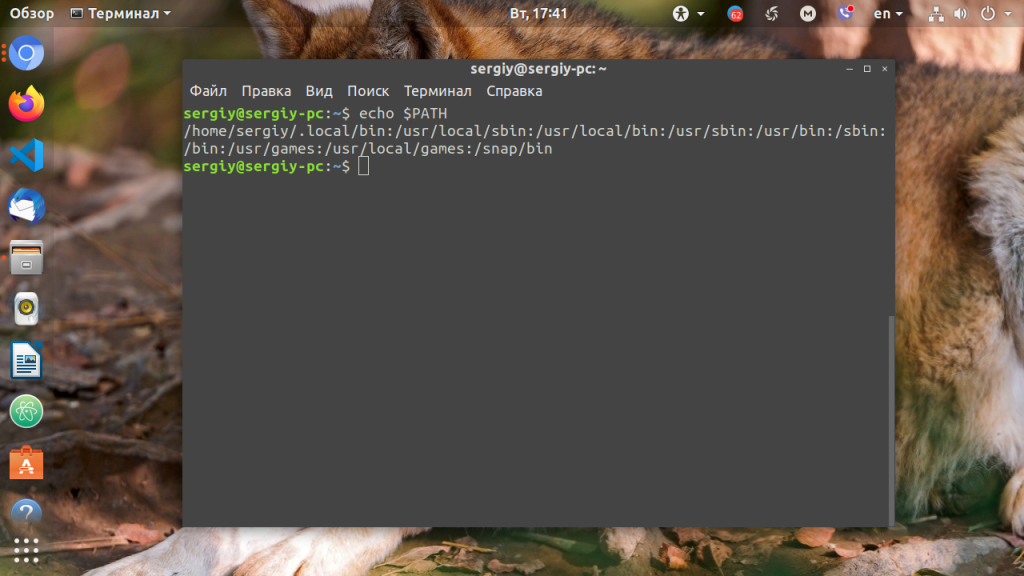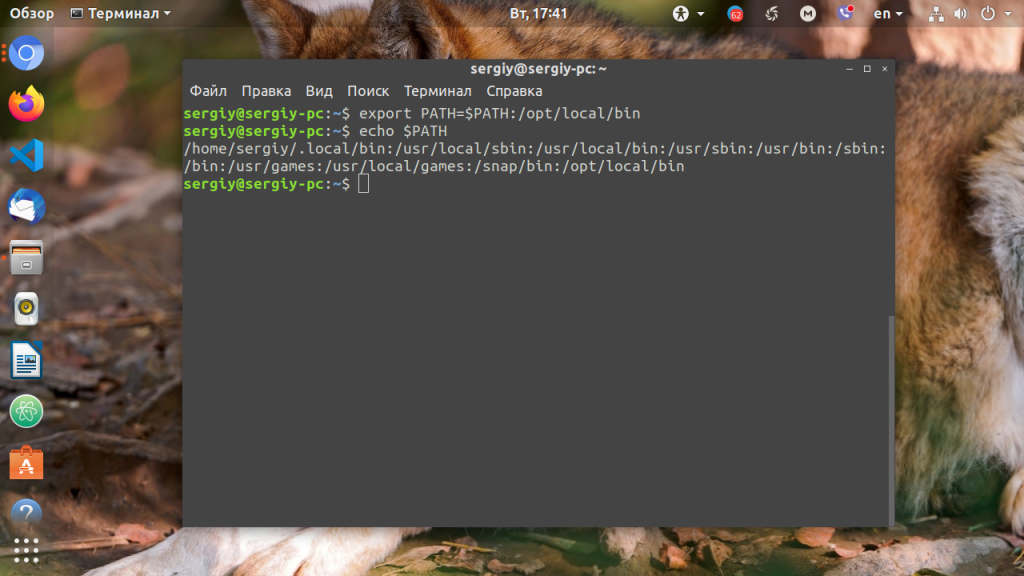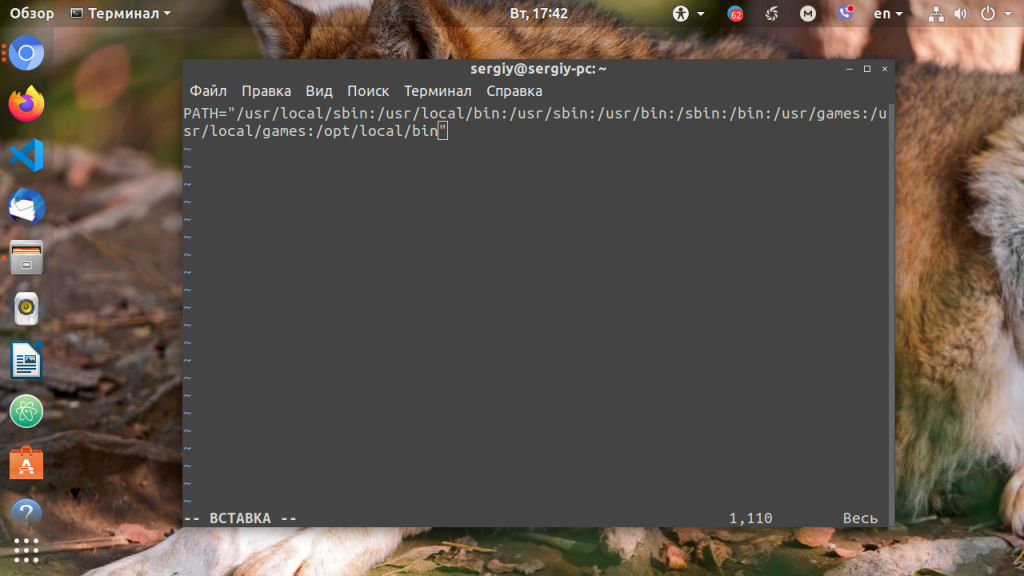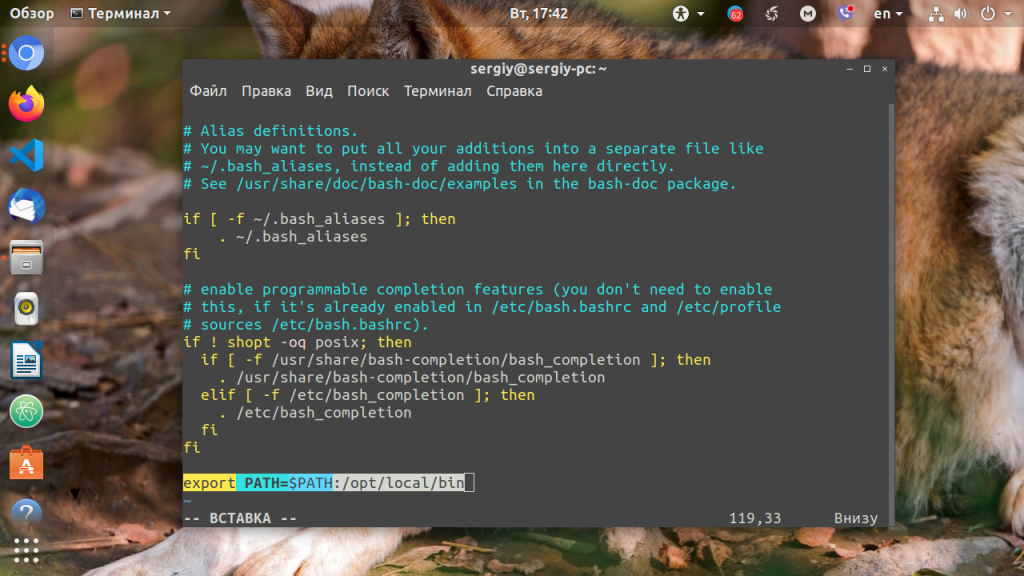- Display or print UNIX / Linux path
- Display current PATH in Linux
- What is a PATH in Linux or Unix?
- How to modify current PATH
- Summing up
- Setting up PATH permanently
- Printing PATH in Linux or Unix
- Print full path of files and sizes with find in Linux
- 3 Answers 3
- Переменная PATH в Linux
- Переменная PATH в Linux
- Выводы
- How can I generate a list of files with their absolute path in Linux?
- 26 Answers 26
Display or print UNIX / Linux path
I am a new Linux or Unix system user and I am using a Debian Linux VPS. How do I print current path settings under BASH or sh or ksh shell?
In Linux or Unix-like file systems, the human-readable address of a resource is defined by PATH shell variable. On Unix / Linux like operating systems, (as well as on DOS / Windows and its descendants), PATH is an environment variable listing a set of paths to directories where executable may be found. This page explains how to print path variable using various commands under Linux and Unix-like systems.
| Tutorial details | |
|---|---|
| Difficulty level | Easy |
| Root privileges | No |
| Requirements | Linux, Unix, or macOS terminal app |
| Est. reading time | 2 minutes |
Display current PATH in Linux
Use the echo command as follows:
echo «$PATH»
Here is my settings from Debian Linux system:
You can use the printf command as well to show the current PATH settings:
$ printf «%s\n» $PATH
Here is my settings from macOS/macOS X Unix desktop:
What is a PATH in Linux or Unix?
A PATH is nothing but the search path for commands. It is a colon-separated list of directories in which the shell looks for commands.
How to modify current PATH
Use the export command to add /opt/games to PATH, enter:
export PATH=$PATH:/opt/games
To format your PATH variable for easy viewing, add following code to your bash startup file (such as
- No ads and tracking
- In-depth guides for developers and sysadmins at Opensourceflare✨
- Join my Patreon to support independent content creators and start reading latest guides:
- How to set up Redis sentinel cluster on Ubuntu or Debian Linux
- How To Set Up SSH Keys With YubiKey as two-factor authentication (U2F/FIDO2)
- How to set up Mariadb Galera cluster on Ubuntu or Debian Linux
- A podman tutorial for beginners – part I (run Linux containers without Docker and in daemonless mode)
- How to protect Linux against rogue USB devices using USBGuard
Join Patreon ➔
Now just run path:
$ path
Here is what I see on CentOS/RHEL/Fedora Linux:
Another option is to run the following command:
echo «$PATH» | tr «:» «\n» | nl
Fig.01: Printing $PATH on Linux or Unix-like system
Summing up
The default shell path ( $PATH variable) is system-dependent, and is set by the administrator who installs bash or ksh or any other shell. However, developers and other Linux and Unix system users can set up their own path using the export command under bash/sh/ksh.
Setting up PATH permanently
Users can edit the
/.profile to set up their path as follows for bash:
Printing PATH in Linux or Unix
Now run:
echo «$PATH»
printf «%s\n», $PATH
How to Checking Path in Unix and Linux
🐧 Get the latest tutorials on Linux, Open Source & DevOps via
| Category | List of Unix and Linux commands |
|---|---|
| Documentation | help • mandb • man • pinfo |
| Disk space analyzers | df • duf • ncdu • pydf |
| File Management | cat • cp • less • mkdir • more • tree |
| Firewall | Alpine Awall • CentOS 8 • OpenSUSE • RHEL 8 • Ubuntu 16.04 • Ubuntu 18.04 • Ubuntu 20.04 |
| Linux Desktop Apps | Skype • Spotify • VLC 3 |
| Modern utilities | bat • exa |
| Network Utilities | NetHogs • dig • host • ip • nmap |
| OpenVPN | CentOS 7 • CentOS 8 • Debian 10 • Debian 8/9 • Ubuntu 18.04 • Ubuntu 20.04 |
| Package Manager | apk • apt |
| Processes Management | bg • chroot • cron • disown • fg • glances • gtop • jobs • killall • kill • pidof • pstree • pwdx • time • vtop |
| Searching | ag • grep • whereis • which |
| Shell builtins | compgen • echo • printf |
| Text processing | cut • rev |
| User Information | groups • id • lastcomm • last • lid/libuser-lid • logname • members • users • whoami • who • w |
| WireGuard VPN | Alpine • CentOS 8 • Debian 10 • Firewall • Ubuntu 20.04 |
Comments on this entry are closed.
accepts an optional argument that is the name of a path-like variable.
Hi,
I did not get either of those path() working. I assume my version of unix does not recognize IFS when applying printf. But this works:
echo $PATH | sed ‘s/\:/\n/g’ | sort
Thanks for that, Pekka. I started using zsh, which has the same problem you described. The original solution works wonderfully in bash, but yours works in zsh.
Ugghh curly quotes. Could not copy and paste.
I am using Zshell, Prezto, OSX. The sed command replaces the : with an n
To get one path per line I used:
Hello Sir;
I am trying to run a program on a cluster and every time I run the program I have this message: mpiexec was unable to launch the specified application as it could not find an executable. ”
so I am suggesting that the program is not recognize the mpixec path. so I need to add the MPI path in my working directory.
my question is how to set this up?
hola necesito decargar un editor ok lo descargo en superusuario y cuando esta descargando me dice q no puede continuar … me aparece esto : dpkg: aviso: `ldconfig’ no se ha encontrado en el PATH o no es ejecutable.
dpkg: aviso: `start-stop-daemon’ no se ha encontrado en el PATH o no es ejecutable.
dpkg: error: 2 expected programs not found in PATH or not executable.
Note: root’s PATH should usually contain /usr/local/sbin, /usr/sbin and /sbin.
E: Sub-process /usr/bin/dpkg returned an error code (2)
Un paquete no se pudo instalar. Tratando de recuperarlo:
dpkg: aviso: `ldconfig’ no se ha encontrado en el PATH o no es ejecutable.
dpkg: aviso: `start-stop-daemon’ no se ha encontrado en el PATH o no es ejecutable.
dpkg: error: 2 expected programs not found in PATH or not executable.
Note: root’s PATH should usually contain /usr/local/sbin, /usr/sbin and /sbin.
help me..
In below code:
Node=/liferay-portal-5.2.0/jboss-tomcat-4.2.3/server/node_portal
export jboss=$Node/../..
echo $jboss
But I need Output as :
Please help me out in this.
How can I make PATH easily to view when I just execute the script? Thanks
You can search/replace within variables as you expand them.
The following replaces ‘:’ with newlines while expanding $PATH, so it’s done without using external commands:
Источник
Print full path of files and sizes with find in Linux
Here are the specs: Find all files in / modified after the modification time of /tmp/test, exclude /proc and /sys from the search, and print the full path of the file along with human readable size. Here is what I have so far:
The issue is that the full path doesn’t get printed. Unfortunately, ls doesn’t support printing the full path! And all solutions I have found that show how to print the full path suggest using find. 😐
Any ideas? Thanks!
3 Answers 3
Instead of -exec ls -lh <> \; you can also use the printf option:
Although that will just print the size in bytes and not in the nice human-readable format ls supports.
Add -d to the ls command.
That will also fix the problem you were bound to have with files showing up twice in your list.
I too enjoy my fullpaths, so I’ve ended up creating few aliases just for such an occasion: alias ldf=’ls $PWD/* -dF’ alias lfp=’ls $PWD/* -daFc —group-directories-first’ alias lfh=’ls $PWD/.* -daFc —group-directories-first’ alias lafp=’ls $PWD/.* $PWD/* -daFc —group-directories-first’ And just simply store ’em to $HOME/.bashrc (these already follow the syntax of .bashrc) Though, if one wants to copy+paste the code to terminal (Not a recommended practice, but I’m not your guardian, so:) Here is a direct paste for .bashrc:
echo » alias ldf=’ls $PWD/* -dF’ alias lfp=’ls $PWD/* -daFc —group-directories-first’ alias lfh=’ls $PWD/.* -daFc —group-directories-first’ alias lafp=’ls $PWD/.* $PWD/* -daFc —group-directories-first'» >>
All of these are basically for the same goal, with minor tweaks for specific purposes; like: ldf=List Directorys Files, lfp= List Full Path -organizing flag used, lfh= List Full Hidden, And last; for all the users and porpoises: lafp = List All-Full Path(both hidden and regulars)
Источник
Переменная PATH в Linux
Когда вы запускаете программу из терминала или скрипта, то обычно пишете только имя файла программы. Однако, ОС Linux спроектирована так, что исполняемые и связанные с ними файлы программ распределяются по различным специализированным каталогам. Например, библиотеки устанавливаются в /lib или /usr/lib, конфигурационные файлы в /etc, а исполняемые файлы в /sbin/, /usr/bin или /bin.
Таких местоположений несколько. Откуда операционная система знает где искать требуемую программу или её компонент? Всё просто — для этого используется переменная PATH. Эта переменная позволяет существенно сократить длину набираемых команд в терминале или в скрипте, освобождая от необходимости каждый раз указывать полные пути к требуемым файлам. В этой статье мы разберёмся зачем нужна переменная PATH Linux, а также как добавить к её значению имена своих пользовательских каталогов.
Переменная PATH в Linux
Для того, чтобы посмотреть содержимое переменной PATH в Linux, выполните в терминале команду:
На экране появится перечень папок, разделённых двоеточием. Алгоритм поиска пути к требуемой программе при её запуске довольно прост. Сначала ОС ищет исполняемый файл с заданным именем в текущей папке. Если находит, запускает на выполнение, если нет, проверяет каталоги, перечисленные в переменной PATH, в установленном там порядке. Таким образом, добавив свои папки к содержимому этой переменной, вы добавляете новые места размещения исполняемых и связанных с ними файлов.
Для того, чтобы добавить новый путь к переменной PATH, можно воспользоваться командой export. Например, давайте добавим к значению переменной PATH папку/opt/local/bin. Для того, чтобы не перезаписать имеющееся значение переменной PATH новым, нужно именно добавить (дописать) это новое значение к уже имеющемуся, не забыв о разделителе-двоеточии:
Теперь мы можем убедиться, что в переменной PATH содержится также и имя этой, добавленной нами, папки:
Вы уже знаете как в Linux добавить имя требуемой папки в переменную PATH, но есть одна проблема — после перезагрузки компьютера или открытия нового сеанса терминала все изменения пропадут, ваша переменная PATH будет иметь то же значение, что и раньше. Для того, чтобы этого не произошло, нужно закрепить новое текущее значение переменной PATH в конфигурационном системном файле.
В ОС Ubuntu значение переменной PATH содержится в файле /etc/environment, в некоторых других дистрибутивах её также можно найти и в файле /etc/profile. Вы можете открыть файл /etc/environment и вручную дописать туда нужное значение:
sudo vi /etc/environment
Можно поступить и иначе. Содержимое файла .bashrc выполняется при каждом запуске оболочки Bash. Если добавить в конец файла команду export, то для каждой загружаемой оболочки будет автоматически выполняться добавление имени требуемой папки в переменную PATH, но только для текущего пользователя:
Выводы
В этой статье мы рассмотрели вопрос о том, зачем нужна переменная окружения PATH в Linux и как добавлять к её значению новые пути поиска исполняемых и связанных с ними файлов. Как видите, всё делается достаточно просто. Таким образом вы можете добавить столько папок для поиска и хранения исполняемых файлов, сколько вам требуется.
Источник
How can I generate a list of files with their absolute path in Linux?
I am writing a shell script that takes file paths as input.
For this reason, I need to generate recursive file listings with full paths. For example, the file bar has the path:
but, as far as I can see, both ls and find only give relative path listings:
It seems like an obvious requirement, but I can’t see anything in the find or ls man pages.
How can I generate a list of files in the shell including their absolute paths?
26 Answers 26
If you give find an absolute path to start with, it will print absolute paths. For instance, to find all .htaccess files in the current directory:
or if your shell expands $PWD to the current directory:
find simply prepends the path it was given to a relative path to the file from that path.
Greg Hewgill also suggested using pwd -P if you want to resolve symlinks in your current directory.
gives the full absolute path. but if the file is a symlink, u’ll get the final resolved name.
Use this for dirs (the / after ** is needed in bash to limit it to directories):
this for files and directories directly under the current directory, whose names contain a . :
this for everything:
In bash, ** is recursive if you enable shopt -s globstar .
This looks only in the current directory. It quotes «$PWD» in case it contains spaces.
Command: ls -1 -d «$PWD/»*
This will give the absolute paths of the file like below.
The $PWD is a good option by Matthew above. If you want find to only print files then you can also add the -type f option to search only normal files. Other options are «d» for directories only etc. So in your case it would be (if i want to search only for files with .c ext):
or if you want all files:
Note: You can’t make an alias for the above command, because $PWD gets auto-completed to your home directory when the alias is being set by bash.
If you give the find command an absolute path, it will spit the results out with an absolute path. So, from the Ken directory if you were to type:
(instead of the relative path find . -name bar -print )
Therefore, if you want an ls -l and have it return the absolute path, you can just tell the find command to execute an ls -l on whatever it finds.
NOTE: There is a space between <> and ;
You’ll get something like this:
If you aren’t sure where the file is, you can always change the search location. As long as the search path starts with «/», you will get an absolute path in return. If you are searching a location (like /) where you are going to get a lot of permission denied errors, then I would recommend redirecting standard error so you can actually see the find results:
( 2> is the syntax for the Borne and Bash shells, but will not work with the C shell. It may work in other shells too, but I only know for sure that it works in Bourne and Bash).
Источник










